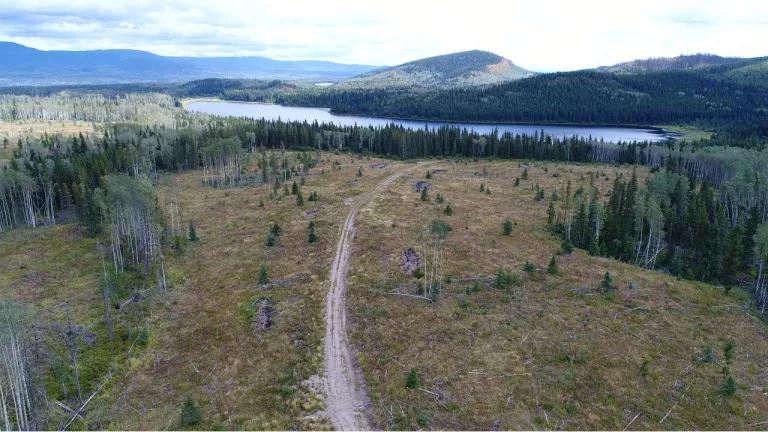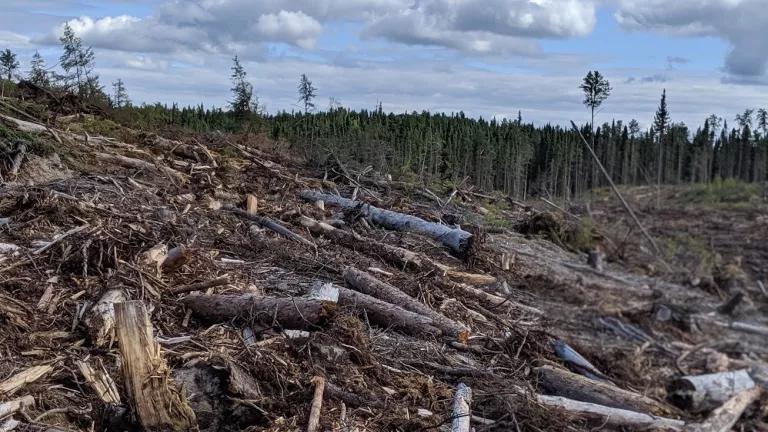Time for P&G to Take Responsibility for Forest Impacts
As P&G shareholders call on the company to issue a report on its efforts to eliminate deforestation and intact forest degradation in its supply chain, P&G has the opportunity to rectify its role in forest destruction.

Clearcutting in Canada's boreal forest
In October, top institutional shareholders in Procter & Gamble (P&G) defied the company’s board in a landslide 67% vote calling on P&G to assess how it can increase the scale, pace, and rigor of its efforts to eliminate deforestation and the degradation of intact forests in its supply chains. The vote came amid mounting pressure from environmental and human rights groups for P&G to rectify its tissue pulp and palm oil supply chains’ ties to the destruction of intact forest areas and threatened species habitat in the Canadian boreal forest and to illegal deforestation and human trafficking in Indonesia and Malaysia.
So far, P&G has neglected to meaningfully respond publicly to shareholders’ concerns, instead posting a new blog, “P&G and Responsible Forestry”, by its Chief Sustainability Officer, Virginie Helias. This blog offers few, if any, insights as to how the company plans to address shareholder concerns, instead perpetuating the same spin P&G has continuously relied on to hide the devastating impacts of its tissue brands like Charmin on the climate-critical Canadian boreal forest. Further, the blog makes a number of misleading claims about the company’s forest sourcing practices and policies, including:
-
Irresponsible forest sourcing: Last year, P&G announced that it will fail to meet its 2020 zero deforestation goal, yet P&G says in the blog that it “prohibit[s] deforestation.” P&G further states that it requires 100% third-party certification of the wood pulp it sources to ensure forests are responsibly managed. Among these certifications, P&G continuously legitimizes Sustainable Forestry Initiative (SFI) certification, which has faced widespread criticism from environmental groups for lacking necessary protections for threatened species and the rights of Indigenous Peoples in comparison to the much more robust Forest Stewardship Council (FSC) certification. Even as P&G continues to rely on SFI certification to support its sustainability myths, dozens of major companies have committed to moving away from SFI.
-
Violating human rights: P&G says it respects the rights of workers, despite FGV Holdings, a P&G joint venture partner and palm oil supplier, being linked to human trafficking and other labor abuses. In late September, this resulted in U.S. Customs and Border Protection moving to ban imports from the Malaysian producer. Moreover, P&G relies on its use of forest certification systems to ensure its wood pulp suppliers respect Indigenous Peoples’ rights, but SFI certification does not explicitly require that logging operations obtain free, prior, and informed consent (FPIC) of local communities that may be impacted. This means that, where P&G has relied on SFI and other weak certification systems, it cannot claim its wood pulp is sourced in a manner that respects the rights of Indigenous Peoples.
-
Failing to protect wildlife habitat: P&G says that it ensures wildlife are protected through its third-party certification systems. But SFI certification has no meaningful requirements for safeguarding threatened species habitat. Moreover, P&G boreal pulp suppliers have been tied to sourcing from critical boreal caribou habitat where herds are already disturbed beyond a sustainable threshold, despite scientists’ warning that industrial disturbances are driving this species’ decline. If P&G wants to ensure wildlife are protected throughout its supply chains, it must cease allowing its pulp suppliers to clearcut critical boreal caribou habitat.
In the lead-up to October’s "investor rebellion", P&G’s ongoing delegation and distribution of its supply chain management to third parties was spotlighted as a serious risk to investors. But one day after that shareholder vote, P&G opted not to publicly take responsibility for the impacts of its supply chains, and instead presented weak, industry-dominated certification systems like SFI as an alternative to meaningfully increasing both transparency and accountability.
As P&G shareholders call on the company to issue a report on its efforts to eliminate deforestation and intact forest degradation in its supply chain, P&G has the opportunity to rectify its role in forest destruction. But preserving intact forests, respecting human rights, and protecting wildlife habitat all require that P&G first acknowledge the problems in its supply chains and set and enforce high standards for its suppliers’ operations on the ground. From the Canadian boreal forest to the rainforests of Southeast Asia, responsible sourcing starts with taking responsibility.




